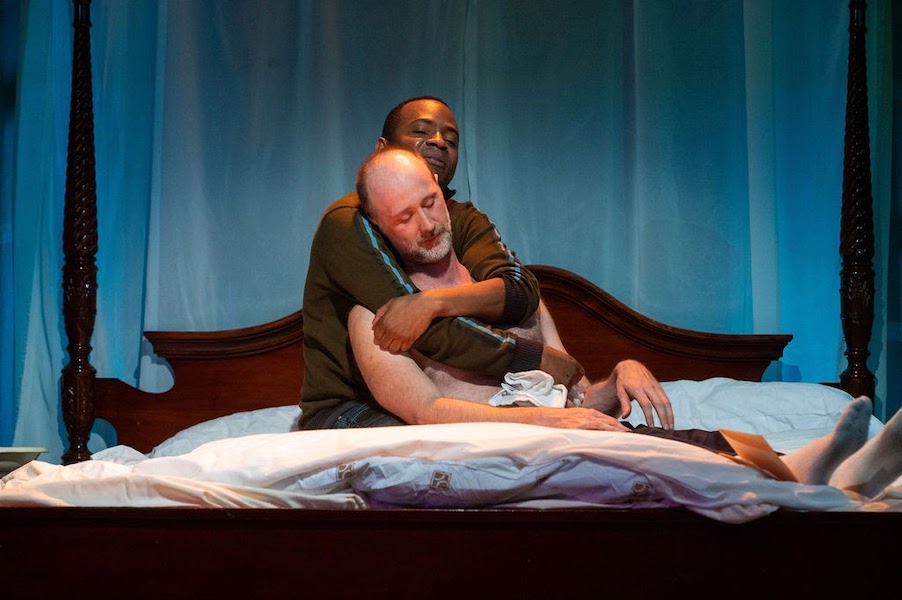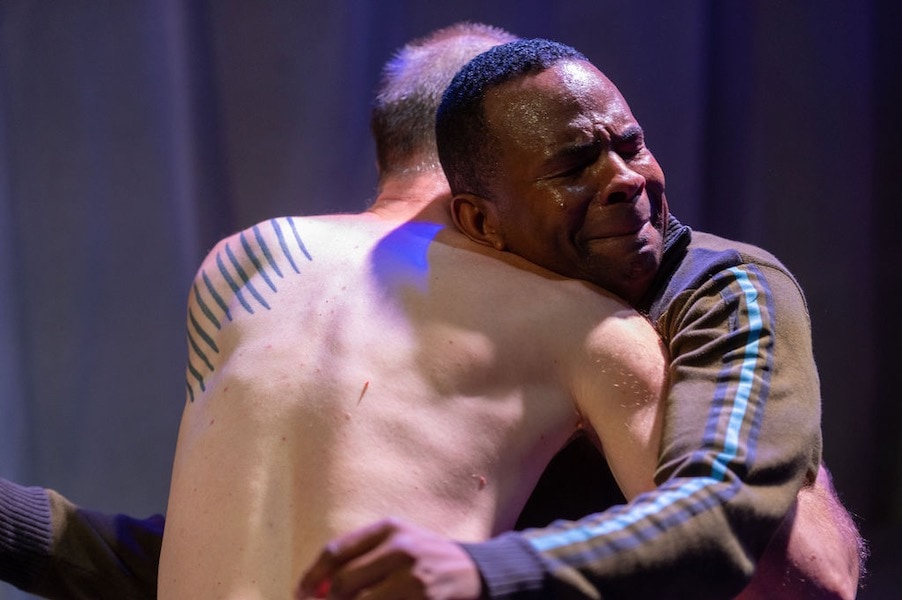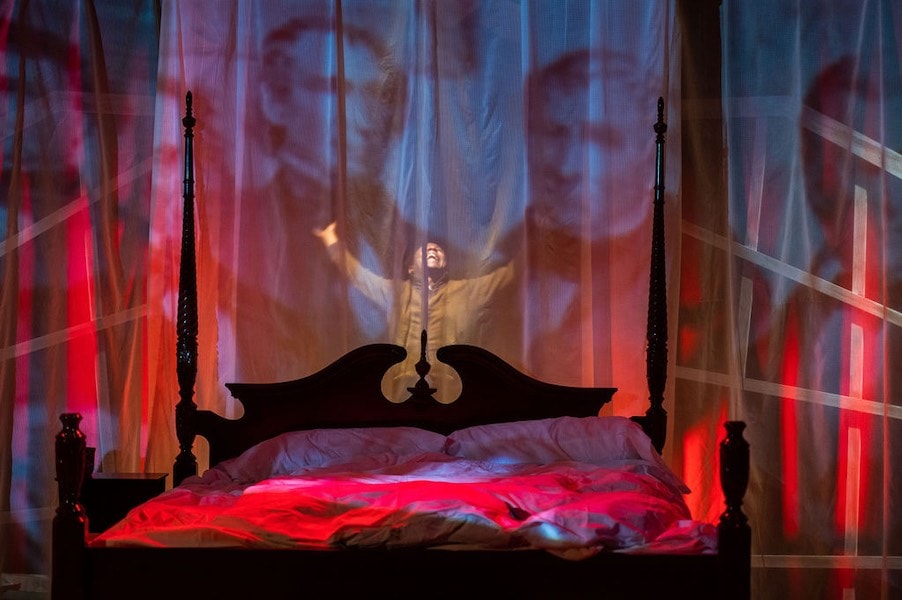The fact that the nation’s preeminent Founding Father was a slaveholder has been an inconvenient sticking point for works of history and fiction — when it’s not being swept under the rug entirely, that is. Coauthors Ken Jones and Daryl L. Harris deserve credit, then, for placing the subject at the center in their play Billy and George, now playing in its world premiere production by Avant Bard under the direction of producing partner DeMone Seraphin. Unfortunately, while this two-hander about George Washington and his enslaved valet William “Billy” Lee is not without insight, its best features are often frustrated.

Billy and George unfolds in a Pennsylvania bedroom during the small hours of Christmas Day 1776, just before General George Washington (John Stange) will make his fateful trip across the Delaware River. George awakes amidst a fit of nightmares brought on by grim recognition that the odds are stacked against the Continental Army. The ever-attentive Billy (Raquis Da’Juan Petree) is quick to comfort him, attending to everything from his military correspondence to his debilitating toothache. Billy is evidently a true confidant, a rare position that allows him to gee up George’s courage and speak candidly on even the most private subjects. At one point, the pair even exchange gifts: Billy gives Washington a family Bible and receives a finely made pistol in return. The two objects become central to Billy and George’s increasingly complex discourse, which builds into a fervent debate over what kind of freedom this War of Independence is really for. Billy proves to be George’s equal in reason, wisdom, and courage, yet the differences in their station and Washington’s sheepish refusal to free Billy before his own death routinely prohibit a true meeting between equals.

The story is framed by an attempt to place it more firmly in the present day. The actors first emerge in modern dress before changing into their period nightwear; Megan Holden’s set, meanwhile, is surrounded by sheer curtains that are projected on by a series of videos and photographs — everything from a litany of American presidents to clips from Childish Gambino’s provocative music video for “This Is America” — curated by lighting and projections designer Hailey LaRoe. The general message that this story should resonate with us today is clear enough, but because the actors literally shed this modern conceit so quickly, it is not clear what specific chords Seraphin and company aim to strike.
This awkward transition encapsulates both the promises and frustrations in the production and in Jones and Harris’s play. Billy and George’s dialogue is at once lived-in and familiar, yet subjects shift so often as to obscure the characters’ objectives and the particulars of their situation. The playwrights’ vision of George — alternately determined and doubtful, contemplative and arrogant — nuances one of America’s most mythologized figures, yet Stange’s fussy portrayal belies the steel that made the man such a commanding leader. Petree is compelling as Billy, finding shades of true affection and wells of disappointment, yet his infectious energy sometimes verges on the jitters. Even when the two click, their chemistry is liable to be undermined by anachronistic props or extraneous projections and sound cues that either distract from the performances or double-down on the play’s more heavy-handed proclamations.
A tendency for overstatement does not suit this play, because if Billy and George can be praised for one thing, it is hinting at some of the finer sociological shades in the relationship between an enslaved person and his “good” owner. While their companionship is intimate to the point of being strangely erotic, one’s power over the other insinuates itself in even the tender moments. In one of the play’s finer sequences, Billy is comforted by George while recounting a harrowing dream that revolves around the sight of his people toiling in the fields. Instead of genuinely sympathizing, George only shrugs Billy’s dream off as “not as bad” as his own. Therein lies the play’s strength: capturing how two people in a staggeringly brutal institution can dwell in very different worlds even while cleaving so close together. It’s part of why George’s refusal to free Billy until death, like so many conditional promises made to Black Americans, hurts so much. Letting moments like that breathe would have brought true clarity to the proceedings.

Running Time: 90 minutes, no intermission.
Billy and George plays through February 11, 2023, presented by Avant Bard Theatre performing at Gunston Arts Center Theatre II—2700 South Lang Street, Arlington, VA. Tickets ($40) can be purchased online or by calling the box office at (703) 418-4808. Avant Bard offers advance-purchase pay-what-you-can (PWYC) performances and 50% discounts for students and veterans, service members, or families of servicemembers.
COVID Safety: Either proof of vaccination or a negative COVID test is requested for entry. In accordance with Arlington County guidelines, masks are optional but strongly encouraged including when watching the performance and moving about the facility.
Billy and George
By Ken Jones and Daryl L. Harris
CAST
William “Billy” Lee: Raquis Da’Juan Petree
George Washington: John Stange
PRODUCTION TEAM
Director: DeMone Seraphin
Production Manager: Alyssa Sanders
Stage Manager: Sarah McCarthy
Stage Manager (sub): Laura Schlactmeyer
Lighting & Projections Designer: Hailey LaRoe
Set Designer: Megan Holden
Sound Designer: David Lament Wilson
Props Designer: Liz Long
Costume Designer: Amanda Jackson
TECHNICAL TEAM
Technical Director: Jarrod DiGiorgi
Master Electrician: Joe Miller
Electrician: Trey Wise
Paint Charge: Sarah Phillips
Avant Bard Producing Partners: Sara Barker, Sean McCarthy, Alyssa Sanders, DeMone Seraphin
Tom Prewitt Arts Management Intern: Liz Colandene (GMU)
Avant Bard Staff: Brian Ash, Natalie Valentine
Photography: Dan Corey, DJ Corey Photography
Avant Bard Producing Partners Emeriti: Megan Behm, Dina Soltan
Special Thanks: Candice Tiffany Gordon
SEE ALSO:
Avant Bard Theatre announces world premiere of ‘Billy and George’ (news story, January 2, 2023)




